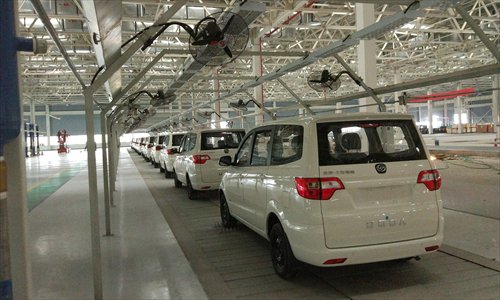Ruili eyes higher trade with Myanmar
The Chinese border city aims to transform by attracting new industries

Cars are assembled at a BAIC plant in Ruili, Southwest China's Yunnan Province. Photo: Zhang Ye/GT
Ruili, a Chinese border city that usually reflects the state of Chinese-Myanmar economic relations, is trying to attract high-tech manufacturing and processing firms, in an attempt to enhance its competitiveness as the US and Japan turn their eyes to the Southeast Asian region.
Four industry parks involving logistics, bio-pharmaceuticals, equipment manufacturing and livestock processing will be established in the frontier city over the following months in partnership with companies including CITIC Group, Luo Hongyu, executive vice mayor of Ruili told the Global Times on Wednesday.
Favorable policies and tax reductions are also being offered and have already drawn in some big firms like BAIC Group, a major Chinese automobile manufacturer.
BAIC is building a plant with an area of about 3,000 mu (200 hectares) in Ruili's Wanding Town, with operations scheduled to be up and running by the end of this year with an annual production of 50,000 vehicles. Those cars will be mainly pickup trucks and multi-purpose vehicles, targeting domestic consumers in southwestern China and in South and Southeast Asian markets.
"We came to the border town under the local government's encouragement. Another important factor for such a move is the town's geographic position," Chen Lei, general manager of BAIC Yunnan Ruili Automobile Co, told the Global Times late on Tuesday.
Their plant in Wanding is about 400 meters away from Pang Hseng in Myanmar, making it possible to export products to Myanmar and other Southeast Asian countries faster and cheaper. Currently, the company ships vehicles to Yangon, Myanmar from Tianjin Port.
"Our final goal is to produce 150,000 units per year," said Chen.
Chongqing Yinxiang Motorcycle (Group) Co is also reportedly gearing up to target Southeast Asian markets with a plant in Ruili which is set to go into operation in September, with annual production reaching 1 million motorcycles.
The urge to change
"Ruili has to make changes, transforming from some kind of a bridge that connects goods from inland China with consumers in Myanmar into a platform that can cultivate high value-added industries locally," said Luo.
Officials and local businessmen are concerned that Ruili is losing its edge as a traditional middleman.
The border city used to play a major role in channeling goods like beverages, commodities for daily use, and TV sets into Myanmar at a time when the country was closed off to most countries in the world under the rule of an oppressive military junta from 1962 to 2011.
However, in recent years, especially after Aung San Suu Kyi's National League for Democracy took over the reins of the country in late 2015, Myanmar is opening up to foreign companies, and the West is fighting hard to lure the once isolated nation.
In May, the US announced that it had removed some of its economic sanctions against Myanmar relating to the banking, timber and mining industries.
The Japanese government-backed Thilawa Special Economic Zone opened in Myanmar in September 2015, and included 23 Japanese companies representing sectors like coal, automotive, insurance and capital investment, according to a Wall Street Journal report.
In February, Nissan Motor Co, which started selling cars in Myanmar in 2013, announced that it would begin assembling vehicles in Myanmar with a production capacity of 10,000 units.
Data from the commerce and trade bureau of Ruili showed that in the first half of the current year, the trade volume between Ruili port and Myanmar slightly increased by 1.2 percent year-on-year to 14.6 billion yuan ($2.2 billion).
"In comparison with those foreign products manufactured in Myanmar, Ruili's export of Chinese goods to Myanmar would lack an edge in pricing given transport costs and high labor costs," a government official told the Global Times on Tuesday on the condition of anonymity.
Labor costs in Myanmar are nearly half the amount in China's inland cities, a businessman surnamed Yin said in an interview with the Global Times.
Policy uncertainties ahead
It seems that plants in Ruili can also enjoy similar labor costs like those in Myanmar. According to government officials, one-fourth of local residents are from Myanmar. However, Chen noted that their expansion into Myanmar is still confronted by policy uncertainties.
Chinese cars, with trucks as an exception, are not allowed to enter Myanmar by land yet.
According to Chen, Myanmar authorities said that they are not ready to import cars via Pang Hseng, which lacks a relevant examination center.
BAIC's Ruili division is hoping that Ruili's government will be able to speed up the permits on car export from Ruili to Myanmar.
Luo said that negotiations between Ruili and Myanmar over further opening-up on cross-border trade are active.
"Officials in Myanmar are still willing to cooperate with China" despite their internal political changes, he noted.
Myanmar's State Counselor and Foreign Minister Aung San Suu Kyi is scheduled to pay a four-day visit to China starting August 17.
This marks her first trip outside the ASEAN region since taking office, indicating that the Chinese market is still important to Myanmar, said Luo, the executive vice mayor.